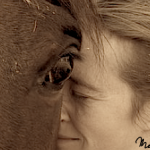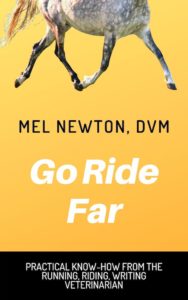When is it time to go back to work?
| August 6, 2010 | Posted by Melinda under Uncategorized |
As most of you probably remember from my discussions after 20MT, I don’t have any hard and fast rules about how much time Farley MUST take off after a ride. My philosophy hasn’t changed since February, but I thought it might be worth going through my thinking again, to see if any of my premises need re-evaluation.
I’m a huge believer in active rest. Farley isn’t in a situation where she can do “active rest” on her own, therefore it’s up to me to provide a level of appropriate activity after an event.
I am uncomfortable giving Farley more than 10 days of true “rest” days – the risk of tying up in a very fit arab mare, even though I watch the sugar and carbs carefully, is still very real.
The active rest and slowly bringing back to normal work levels generally looks something like this:
- 10 days of hand walking, light lunging, some true rest days, maybe some hand jogging, and maybe some riding on the canal banks, doing some light hacking. Near the end of the 10 day period, some dressage (long and low with lots of stretch) at the walk and trot.
- Gradually, return to normal work, but no intense workouts (for example – a true conditioning trail ride) for 4-6 weeks. I would expect her to be back to normal work (walk/trot/canter dressage in the arena 3-4 days a week with a walk/trot/canter canal ride 1-2x week) within 2-3 weeks of the event, depending on how hard an event it was.
- At all times listen to the horse, and error on the side of more easy work/rest.
After 20 MT, a relatively easy 100, she was more than willing to start building the work load at 10 days, and within 2 weeks was more than happy to putter around the arena doing our assigned dressage homework.
Tevis Recovery
She’s definitely taking longer to recover from Tevis, which I would expect – it’s a harder ride – so we’ve been taking it easy. She’s being ridden lightly this week at the walk and trot, and although I might ask for a canter next week, I won’t be comfortable schooling the canter or doing any other “real work” until probably the end of next week (3 weeks post Tevis). At this point, just shy of 2 weeks post Tevis, her attitude is good and we are focusing on having fun and enjoying each other’s company.
I do not plan to do any conditioning rides between now and Virginia City 100, which is 7 weeks post Tevis. Just dressage, a fun trail ride over Labor Day weekend with family and friends, and…a cavalry event (see below)! I’ve learned over the last year that Farley keeps her conditioning very well from ride to ride, and it takes very little to maintain it from event to event, if the events are ~6-8 weeks apart. Dressage and the occasional hack seem to be more than enough.
Cavalry Event and a little fun…..
Four weeks post-Tevis I have a cavalry event planned. More details to come, but I think it will be a good change of pace for us both. It’s strictly for fun, no pressure to do well, and I’m more than willing to scratch from a class if either of us aren’t particularly keen on a certain event. At 4 weeks post Tevis and 3 weeks pre VC100 the timing is perfect. Farley is a horse that seems to enjoy doing different kinds of things, and I think doing this event is a perfect way to break up the time between Tevis and VC100.
And then what? Plans for the season post-VC100
My intention is to give Farley and I both ~2-3 months off this winter. During that time we will only ride when we feel like it. For one of those months, I’m going to suspend the dressage lessons and schooling. I have a couple of choices of WHEN exactly to take the break, but right now, this is what I’m tentatively planning.
- For 10 weeks after VC100, I will be doing what seems “fun and easy” – ie I’ll still try to ride 2-3 days a week, but nothing serious and if I want to play hookey and see a movie or stay home and eat popcorn and read books, I will. If the dressage is going well, then we might do a dressage show in late October or in November. If it’s not going well, I might take a month off from lessons during this time period and get my saddle reflocked.
- Do an unspecified amount of days at the Desert Gold Thanksgiving ride.
- In the 13 weeks between Desert Gold and 20 MT, take one month off from dressage lessons, send saddle for reflocking if it wasn’t done in the fall. Interact with Farley daily, but no pressure to ride for at least 2 months (one of those months to include the no-lessons month). Do a conditioning ride in the month of January and decide whether I want to do 20MT or if I want more time off.
December/January/February are historically the hardest months of the year for me emotionally and physically so I’m preparing myself for those months by giving myself permission to either ride or not ride, depending on how I feel, without guilt (which only adds to the mental problems this time of year). I think this schedule give both of us enough downtime, with at least 1 month of guaranteed very-little-riding because my saddle will be out for reflocking, and I won’t have lessons. My riding will be severely curtailed when I start school next September (2011), so even if I do decide to do 20MT 2011, than it will only be a 5 month ride season, as opposed to the 7 month season I had this year.
No matter what occurs at VC100, we have had an awesome, incredible season. Providing that we finish VC100, I will be one 50 mile ride shy of my 1000 miles and Farley will be 150 miles behind me. Farley will have reached her “bronze” level in the 100 mile incentive program, and there’s a chance we will be in both the 100 mile national standings (not likely) and the regional weight division standings (more likely).











[…] Five years ago: When is it time to go back to work? […]
Wow, I’m really impressed that you’re scheduling permission to not train. Really good idea!